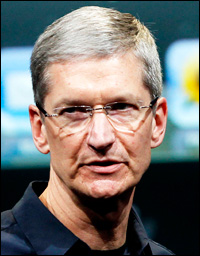
US experts argue Apple is innovation killer
Experts say US firm resorts to frivolous litigation to smolder smart creativity

Even U.S. officials and patent experts now see Apple’s bid to ban the sale of Samsung Electronics smartphones as detrimental to keeping the information and technology industry innovative.
Against this background, U.S. Judge Lucy Koh is being asked by Apple to triple the $1.05 billion in damages the jury in San Jose, Calif., told Samsung to pay the American firm in the patent suit. Her ruling is due on Sept. 24.
However, there is growing evidence that suggests Apple is not as much of an innovator as has been believed with an internal memo showing it may have copied Samsung and LG products for its first iPhone.
Government officials and patent experts in the United States argue that a complete sales ban on Samsung products will hurt innovation.
On Thursday, John R. Read, chief of the antitrust division at the U.S. Department of Justice (DOJ), admitted that there was a possibility the verdict could be overturned.
Usually, jury verdicts are difficult to overturn, though some adjustments are possible. Koh is currently in the process of reviewing a variety of related issues along with Samsung’s demand she overturn the jury’s verdict in the next several weeks.
Read clarified that the verdict shouldn’t prohibit Samsung from selling its products in the United States as he believes innovation comes from healthy competition.
“For an important company such as Samsung Electronics, it can sell its products through competition and that will actually spur innovation. I hope Samsung Electronics can sell its products in the United States despite the verdict,’’ Read said at the Seoul International Competition Forum (SICF) organized by the Fair Trade Commission (FTC) in Korea.
Right after the decision in California, Apple filed a new complaint against 17 Samsung’s Galaxy line devices, including its latest Galaxy S3 smartphone.
It is aiming to get not only Samsung’s Galaxy S3 banned, but also targets Galaxy Note tablets and the company’s Galaxy Tab 10.1. A hearing regarding this ban has been scheduled for Dec. 6 by Koh.
Read stressed his remarks were personal and did not represent the top US legal authorities’ views on the issue.
Read is not the only senior US official that has expressed an opinion about the ongoing Samsung-Apple dispute, which is the biggest technology legal tussle in a history.
Willard Tom, a general counsel at the U.S. Federal Trade Commission (USFTC), pointed out patent disputes are hard to decide on in court, but apparently defended the current jury system in the United States.
“In some specific legal cases such as issues relate to intellectual properties, verdicts from non-experts could raise controversy. There were debates 30 years ago. But any jurors who are reasonable can make decisions,’’ said the USFTC official.
The jury foreman Velvin Hogan may have sold patents to Apple, while the jurors paid little attention to checking documents filed by Samsung that said the iPhone was influenced by Samsung and LG phones, said officials from Samsung and other patent experts in Seoul.
Then there were the “confident statements’’ by Hogan. He reportedly told the court that the jurors had filled out all of the 700-question form without needing to read the jury instructions. Critics say there’s nothing wiser than a clever engineer, however this might smack of an excess of confidence.
Samsung still insists the Apple victory could limit consumer choice as it believes consumers don’t make mistakes.
“These are the key things that the presiding Judge Koh should consider before making her ruling that will come soon,’’ said an unnamed Samsung executive.
Seoul Central District Court previously ruled Samsung didn’t infringe on Apple’s design patents, while the Tokyo District Court also sided with Seoul by dismissing Apple’s request for an infringement of its patents by Samsung.
Cross-licensing?
Albert A. Foer, the president of the American Antitrust Institute (AAI), stressed it’s not desirable for the Samsung-Apple dispute in the United States to bring a result that bans Samsung products.
“Stricter punishment for Samsung could hurt market competition and negatively impact consumers,’’ said the president, adding the company should have access to the United States to help companies accelerate product innovation.
Samsung was asked by Apple to pay $30 for each Samsung device using Apple patents, which the Korean firm refused to accept. Samsung is also seeking a 2.4 percent royalty for each Apple device for using Samsung’s mobile patents.
Reiterating Samsung Electronics’ earlier commitment to the fair, reasonable, and non-discriminatory terms or FRAND principle, Apple is saying that Samsung’s request is unacceptable and offered to pay less than a dollar for the patents as it believes they are standard essential patents.
Foer said the two consumer electronics giants may settle the global disputes by paying royalties to each other or updating cross-licensing agreements, though he declined to elaborate further. He also defends the current jury system in the United States.
“In patent disputes, we have appeals courts. Also, we have experts who are highly knowledgeable in specific issues and themes. Whether it’s wrong or right to use common sense from reasonable jurors in rulings, that’s difficult for me to judge,’’ Foer said.
“The remarks by the influential government officials in the United States may mean the jurors siding with Apple is controversial,’’ said an official from the Korea Patent Attorneys Association by telephone.
The Hague court will review a Samsung-Apple patent lawsuit, later today, while there will be four more cases heard in Mannheim between mid-September and mid-October.
Two design-rights-related hearings are also to be held by the Dusseldorf Regional Court ― the first court in the world to ban the Galaxy Tab 10.1 ― in late September and late October. <The Korea Times/Kim Yoo-chul>



